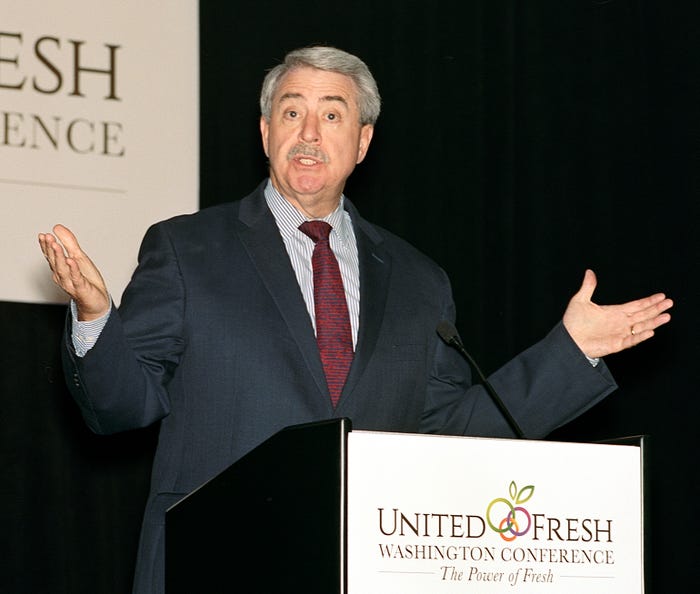October 9, 2018

By Dorothy Noble
Ted McKinney, USDA's undersecretary for trade and foreign agricultural affairs, says the Trump administration is committed to opening new markets for farmers around the world.
Speaking at the global trade forum during the recent Washington Conference of the United Fresh Produce Association, McKinney says there are many untapped markets for U.S. agricultural products.
Later this month, his office is leading a trip to engage with potential customers from South Africa, Angola, Botswana, Lesotho, Madagascar, Mauritius, Mozambique, Namibia, Swaziland, Zambia and Zimbabwe.
"There is growth opportunity for agricultural exports to these countries where shipments grew 25% in value in 2017," McKinney says.
In the United Kingdom, McKinney says trade opportunities exist in Scotland and Ireland.
But there are also barriers to opening new markets. In the European Union, for example, pesticide use is more heavily regulated than in the U.S. McKinney says that he prefers pesticide-use standards set by the U.S. Codex Office, an office he oversees, which pushes more science-based food standards.
In India, McKinney and his staff are pushing the importance of science-based food safety policies.
When it comes to China, he says many issues need to be worked out between the two countries. For example, China won't accept certain products at certain times of the year.
"We are trying to fix problems and have been trying for a long time. We have not been treated fairly," he says. "(But) I'm not ready to call it a trade war."
A flurry of activity has occurred since McKinney spoke to the produce association. The Trump administration has ratified new trade agreements with South Korea and has started negotiations with Japan on a new agreement.
 OPENING TRADE: Ted McKinney, the USDA's undersecretary for trade and foreign agricultural affairs, talked about trade expansion at the United Fresh Produce Association's Washington conference.
OPENING TRADE: Ted McKinney, the USDA's undersecretary for trade and foreign agricultural affairs, talked about trade expansion at the United Fresh Produce Association's Washington conference.

More recently, a new trilateral trade agreement between the U.S., Mexico and Canada was announced. New technology such as gene editing will be covered under the agreement. There are also provisions to reduce trade distortions; promote nondiscriminatory grading standards and science-based sanitary and phytosanitary measures; increase market access for certain named products and rules for origin requirements; and add more protections for proprietary formulas.
In addition, Canada agreed to grade U.S. wheat no less favorably than Canadian wheat and will also expand markets for U.S. dairy.
Trilateral trade between Canada, Mexico and the U.S. grew 370% between 1994 and 2016. In the past five years, fresh fruit and vegetable sales to NAFTA partners totaled more than $25.1 billion. The new agreement must be ratified by Congress and the Mexican and Canadian legislatures.
Tom Stenzel, president and CEO of United Fresh Produce Association, says he is encouraged by the USMCA agreement.
"The strong relationships our members have established between these three countries have helped enable the growth of the fresh produce industry over the last quarter century. Coming on the heels of United Fresh's annual Washington Conference and the inaugural Global Trade Forum in which this issue was front and center, and where attendees heard directly from key U.S. negotiators, the announcement of this revised agreement highlights the importance of our continued engagement on key policy issues by those in the produce industry," he says. "United Fresh looks forward to working with Congress to achieve the swift approval of this new agreement."
McKinney says the recent trade retaliation program announced by the Trump administration will affect programs within the Foreign Agricultural Service, which he runs. The Agricultural Trade Promotion program provides cost-share assistance for consumer advertising, public relations, point-of-sale demonstrations, participation in trade fairs and exhibits, and market research. Up to $200 million will be made available for segments affected by tariffs.
Applications will be accepted until Nov. 2 with funding awarded in early 2019.
Noble writes from western Pennsylvania
You May Also Like




